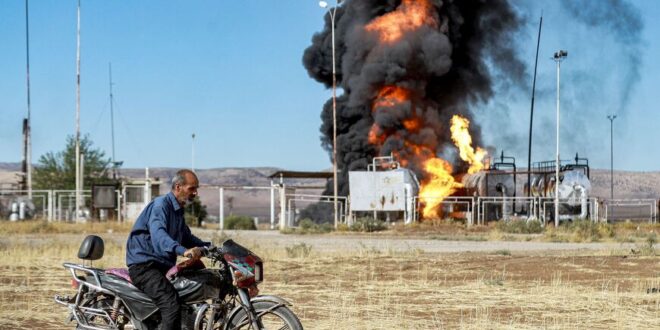The US readout of a call between the top US and Turkish diplomats stressed the two countries share a common objective of defeating terror.
Turkey expanded its air campaign against Kurdish autonomous zones in Syria and Iraq on Friday, even as senior Biden administration officials held calls with their counterparts in Ankara to discuss deconfliction and counter-terrorism mechanisms.
The Turkish defense ministry said on Friday that its air forces destroyed 15 new targets on the second day of the operation in northern Syria. The new statement brings the total number of strikes to 45 in the last 48 hours. The ministry didn’t provide details on Friday’s strikes, but according to local sources, Manbij, Kobane were among the targets.
On Thursday, the ministry said 30 targets were hit in Tell Rifaat, Derik and Jazeerah regions, “including an oil well and an oil storage facility … used by terrorists.” Derik and Jazeerah have often been targeted by Turkish forces over the years, but Ankara has largely refrained from hitting Kurdish militants’ positions in Tell Rifaat, which is within the zone of Russian influence. As of this writing there has been no public reaction from Russia to the ongoing Turkish strikes.
On Friday, Turkish forces also conducted a pinpoint drone attack in the Iraqi Yazidi majority region of Sinjar. Citing security sources, the state-run Anadolu News Agency said militants who were allegedly in preparations for an attack on Turkish troops were “neutralized.”
Sinjar has remained another flashpoint for Ankara since the region’s liberation from the Islamic State in 2014. Turkey considers the Yazidi Shingal Resistance Units (YBS) militia another offshoot of the Kurdish separatist group and argues that PKK fighters use the area as a supply line between bases in northern Iraq and northern Syria. YBS, in turn, denies that it supports the PKK.
The strikes came after Turkey’s Foreign Minister Hakan Fidan openly declared this week the oil facilities as well as infrastructure and superstructures in the regions held by the US-allied Syrian Democratic Forces (SDF) as “legitimate targets.” The operation is in response to a suicide bombing attack in central Ankara last Sunday which left two assailants dead and two police officers wounded. The PKK, which has been fighting against the Turkish state for Kurdish self-rule inside Turkey since 1984, claimed responsibility for the attack.
Fidan said Turkish authorities established that the two militants traveled to Turkey from northern Syria where they also had received training from the Kurdish militants. The Kurdish-led SDF, meanwhile, denied the accusation.
Aside from the targeted killings of alleged PKK cadres through drone strikes by Turkish intelligence, Thursday’s sorties mark the second wave of their kind this year. Turkey has been pressing the administration to cut its ties with the SDF and for the withdrawal of an estimated 900 US troops from northern Syrian regions held by the group. The Pentagon said Thursday that US troops took shelter in bunkers amid the Turkish strikes.
Since Sunday, Turkey has been hitting several regions in northern Syria and northern Iraq in retaliation for the Ankara attack. The PKK, which has multiple bases in northern Iraq, is considered a terror outfit by the United States and European Union, but not its Syrian offshoot the People’s Protection Units, which remains the dominant group within the Kurdish-led SDF.
US-Turkey deconfliction diplomacy
The uptick in strikes came as Fidan and his American counterpart Antony Blinken held a call on Friday which discussed the deconfliction mechanism, a day after the United States downed a Turkish drone in northern Syria, the first such incident between the two NATO allies.
Ankara and Washington issued different readouts from the call, however.
“It was agreed that the deconfliction mechanism should be operated effectively in a way that does not hinder our fight against terrorism,” noted the Turkish readout. Fidan also “strongly” conveyed to Blinken that the United States “should stop working with the terrorist organization,” and that his country’s counter-terrorism operations in Iraq and Syria would continue decisively.
The US readout, meanwhile, stopped short of mentioning any agreement. Instead, it said Blinken “highlighted the need to coordinate and deconflict our activities.”
It added that the two chief diplomats “underscored that the United States and [Turkey] share a common objective of defeating terrorist threats. Regardless of where the threats are based — in Syria, Iraq, or elsewhere — they undermine the security of the United States, [Turkey], and our allies.”
The phone call came after the Turkish Foreign Ministry said earlier on Friday that steps were being taken after the downing of the drone. “During operations, one UCAV was lost due to varying technical assessments in the deconfliction mechanism with third parties. Necessary measures are being taken to ensure a more effective operation of the deconfliction mechanism with the relevant parties,” the statement read.
A Pentagon readout released after US Defense Secretary Lloyd Austin and his Turkish counterpart Yasar Guler spoke on Thursday said Washington stressed “maintaining strict adherence to deconfliction protocols and communication through established military-to-military channels.”
Chairman of the Joint Chiefs of Staff Gen. CQ Brown and his Turkish counterpart Metin Gurak also discussed the “need to follow common deconfliction protocols to ensure the safety of” US troops in Syria, according to a separate Pentagon readout.
15 reportedly killed
In a statement on Friday, the SDF called upon Moscow and Washington to express stronger position against the Turkish offensive. Pointing out that the US-led coalition forces downed a Turkish drone because it was approaching one of their headquarters, the SDF statement said the United States and Russia “should state a clear position in responding to the Turkish occupation targeting of civilians and service institutions.”
The statement added that the Turkish campaign killed 15 people including eight civilians. Al-Monitor was unable to confirm the toll independently. Numerous oil and electricity facilities and water stations as well as military positions were destroyed in the strikes, the statement said.
 Eurasia Press & News
Eurasia Press & News




